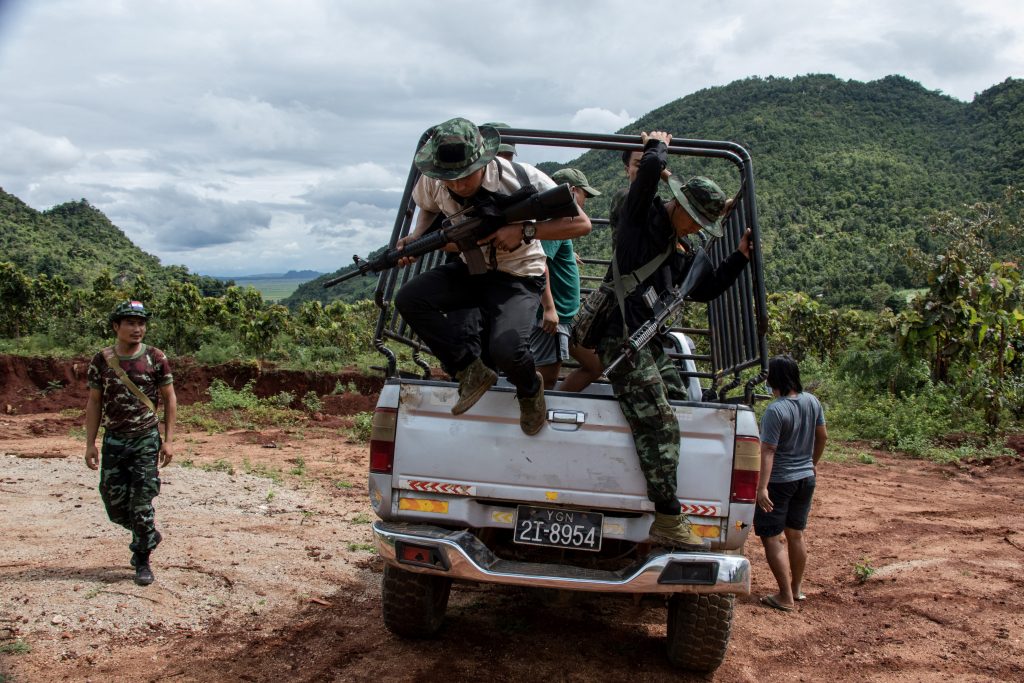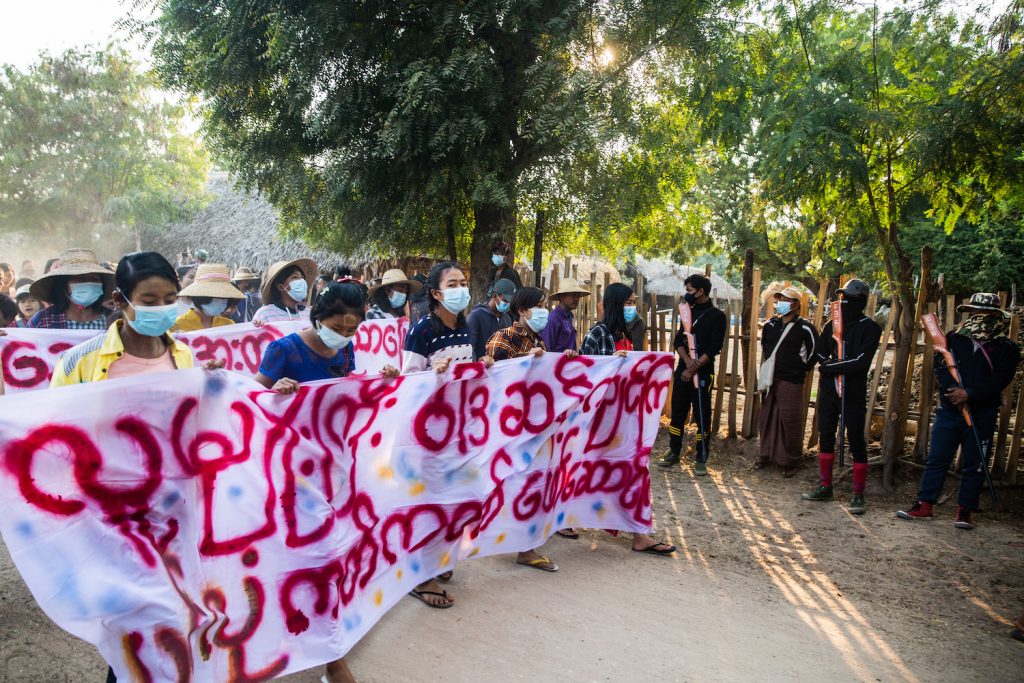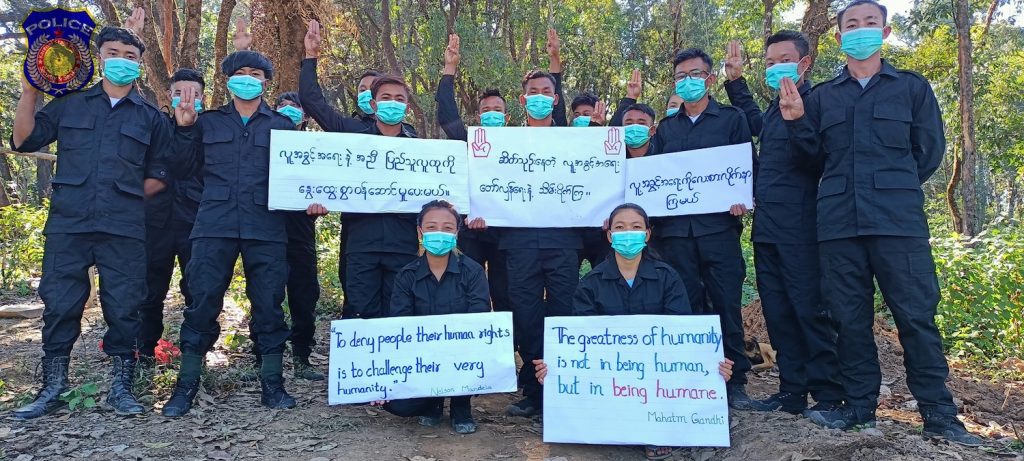Rule of law has collapsed since last year’s coup, giving rise to rampant military rights abuses and vigilante justice. Emerging parallel legal structures in resistance strongholds are giving some hope that a fairer Myanmar is on the horizon.
By FRONTIER
The incident on May 15 rattled 31-year-old Yangon lawyer Ko Zaw Oo*. As he was on his way home, three young men tried to snatch his wallet in broad daylight at the corner of Pansodan and Maha Bandula roads, in the middle of the city’s busy downtown area.
“At first, they followed me. Then, as I turned around, their hands reached for my backpack.” When Zaw Oo shouted in panic, the three men began to physically attack him. But Zaw Oo was lucky – bystanders noticed the incident and raised the alarm, causing the would-be thieves to flee.
“When there are no people around, it is very dangerous,” Zaw Oo said.
More than a year on from the military’s 2021 power grab, reports of petty crimes are rising in major cities largely under the junta’s control, like Yangon and Mandalay.
“We hear about a lot of robberies and burglary cases daily,” Zaw Oo claimed. “Rule of law is breaking down in the whole country.”
As Myanmar’s social fabric disintegrates, many are looking to anti-coup armed groups, mostly known as People’s Defence Forces, and the parallel National Unity Government to fill the gap. The NUG was appointed by lawmakers elected in the 2020 polls, which the military refused to recognise, and declared a “people’s defensive war” against the junta last year.
In PDF strongholds, where the junta’s administration has failed to take root, the NUG is beginning to roll out parallel administrative functions, like school systems and a budding judicial system. There is also a long history of parallel institutions in areas of Myanmar populated by ethnic minorities, where successive Bamar-dominated governments have largely neglected the needs and desires of the local communities.
On June 7, the NUG President’s Office announced the formation of a People’s Police Force to help establish rule of law and begin efforts to hold military leaders accountable for crimes against civilians. The Assistance Association for Political Prisoners has confirmed at least 2,000 civilians killed by the regime since the coup.
“This is the first step,” U Kyaw Zaw, a spokesman for the NUG President’s Office, said in an interview with Frontier. “In the same way, judicial bodies will be formed in our stronghold areas.”
He said judicial systems are being rolled out in areas where the NUG has successfully established “administrative mechanisms”. This seems to include towns in Magway and Sagaing regions, which have been a hotbed of resistance, although Kyaw Zaw declined to identify exact locations for security purposes.
“We welcome the implementation of the rule of law. That’s needed in our area,” said Ko Hlyap See, the nom de guerre for the leader of the People Revolution Front-Pakokku, which is based in Magway’s Pauk Township. “But there are many difficulties and challenges. It will take a lot of time to be effective,” he added.

Grassroots police force
Even before the NUG announced formal law enforcement efforts, grassroots campaigns were underway in some resistance strongholds. The Karenni State Police (KSP) was formed in August last year after the Karenni Nationalities Defense Force managed to beat back the military across large parts of Kayah State. The KNDF is a coalition of armed groups that includes those formed after the coup as well as the Karenni Army, which has been fighting for the rights of the Karenni people for decades.
Ko Bo Bo, a spokesman for the KSP, told Frontier that the KSP was founded by more than 300 police officers who had joined the nationwide strike of civil servants known as the Civil Disobedience Movement. Kayah State has seen a larger exodus from the military-controlled Myanmar Police Force than other states and regions.
“After the military coup, there were many drug cases in our area. And we need to arrest dalan for reporting revolutionary group information to the military,” said Bo Bo, referring to military informants. “So, we decided to form a police force to handle these cases.”
Hundreds of alleged informants have been assassinated since the coup, a controversial tactic that resistance groups have defended as necessary to the revolution’s success. But with some groups like KNDF now more established, they are pursuing a systematic form of law enforcement.
KSP operates in cooperation with the KNDF and the Karenni State Consultative Council, a coalition of local politicians, civil society leaders and armed groups. In a video released on May 14, the KSP said it had established police stations and prisons, which were holding 80 inmates, including informants and drug dealers. Two weeks later, the KSCC announced that the KSP had released 24 suspects due to a lack of evidence, while 102 others convicted of drug crimes, theft, or supporting the military remained in custody. The decisions followed an examination by a judiciary committee made up of legal experts, resistance administrators, social welfare groups and women’s leaders.
The KSP has expanded beyond the original batch of striking police officers and is now training new recruits. At present, KSP says it has a criminal investigation department, ranger department, intelligence department and combat department.
“The KNDF is resisting the military council. In the same way, we protect our people with the police services,” said Bo Bo.
In December of last year, other CDM police officers formed the Kalay Police Service (KPS), based in Sagaing Region, under the direct supervision of the NUG.
“Since the coup, drug trafficking and consumption is also rising in our area,” said Min Aung* a police officer with KPS.
“With the formation of the police force, we can control a lot of these issues,” Min Aung said, adding that the existence of a police force to deal with these issues frees up PDFs to focus on fighting the military.

Vigilanteism takes root
Across Myanmar’s central Dry Zone, fierce resistance to the coup has prevented the military from rolling out its administration in many townships, but this has also led to lawlessness. Efforts to administer justice without a central authority have seen mixed results.
Ko Yaung Ni, the alias of the leader of an NUG-affiliated armed group in Sagaing’s Tabayin Township, said the proliferation of anti-coup armed groups has led to some tensions.
“Many groups have problems with each other and there are disputes between security teams,” Yaung Ni said, adding that disputes sometimes turn violent.
A Yinmabin-based PDF has been accused of killing 21 people, including civilians and 10 fighters from another resistance group, leading the NUG to launch an investigation. Yaung Ni said the advent of NUG-controlled judicial systems would allow them to better settle disputes without violence.
He also said it will allow resistance groups to deal with dalan more ethically.
On May 27, he claimed a 45-year-old woman was beheaded in Tabayin, after allegedly helping the military attack and burn down a village. “She had a child,” Yaung Ni said. “The woman was definitely dalan. But we need to have a fair trial.”
In Kantbalu Township, vigilante violence is already giving way to more systematic measures. Ko Lin Tun* said a member of the pro-military Union Solidarity and Development Party was arrested in his village, after he was accused of being a dalan in March.
“He received a lot of death threat letters,” Lin Tun said. The local PDF detained him and transferred his case to a village judiciary which investigated him. “After the investigation by the village judges, they found that this guy was not a dalan,” Lin Tun said.
The suspect was subsequently released, with the village administration warning that anybody who continued to threaten or harass the man and his family would be arrested themselves.
“This is a change,” said Lin Tun. “I think if a PDF in other areas receives information about a dalan, action should be taken after an investigation. If not, it is very dangerous.”
In neighbouring Magway Region, a committee of community elders investigates alleged crimes in Pauk Township, while resistance groups dole out punishments.
Hlyap See, from the PRF, said petty criminals like thieves are sentenced to one to seven days in a chain gang at the armed group’s camp, and any resistance fighters that abuse civilians are beaten by their superiors. The use of forced labour and judicial corporal punishment are generally seen as human rights violations, although prison labour remains common worldwide and corporal punishment is still used by fellow ASEAN countries Indonesia, Malaysia, Singapore and Brunei.
In Myaing Township, PDFs say they control all rural parts of the township, and criminal cases are handled by a Community Security Team. “There are no thefts or robberies in our area yet,” said a spokesperson for the Myaing PDF. “If such cases occur, we will take firm action. We will not forgive.”
But the patchwork attempts at community law enforcement have also led to some shocking human rights abuses.
One man told Frontier that his 23-year-old sister was raped by a farmer in a village controlled by a resistance group in Magway Region in April. When she discovered she was pregnant, the resistance group forced her to marry her assailant.
“They said that solved the problem… We don’t think it is fair, we don’t like this decision,” he said. “If there is a judiciary with people who understand the law, they would make a different decision. We need courts for cases like my sister’s.”
Daw Khin Ohmar, chairperson of rights organisation Progressive Voice, said the military is “ultimately responsible” for the breakdown of rule of law, but called for the NUG, ethnic armed groups and PDFs to “adopt a code of conduct” to implement a “survivor-centered, gender-sensitive and non-discriminatory approach” to sexual assault. “This means for example a rape victim must not be forced to marry the assailant,” she said.
Khin Ohmar said any NUG justice system must “comply with international human rights” and the Ministry of Defence “must ensure groups on the ground follow the code of conduct” and protect women. She also called for the Committee Representing Pyidaungsu Hluttaw, a group of lawmakers elected in the 2020 polls, to adopt a law specifically preventing violence against women.
But while rule of law has further collapsed since the coup, Khin Ohmar said the military has operated “above the law with blanket impunity for 7 decades”, with ethnic women disproportionately affected by the military using “rape as a weapon of war”.
She said, “as long as the military stays above the law, there would be no rule of law in Myanmar.”
‘The foundation of our new country’
The NUG is aware of the problems on the ground and is working to bring the ad hoc resistance legal systems under central control and up to professional standards.
“If cases are decided without understanding of the law, justice will not be served,” said Dr Yamin Oo*, a lawyer working in the NUG’s Ministry of Justice. “It’s very, very dangerous.”
Kyaw Zaw, the NUG President’s Office spokesman, said progress is being made on this front.
“There are crimes in the areas under our control. The strong will bully the weak. The judiciary is working to prevent this from happening,” he said.
He said specific NUG-controlled courts are now operating in some townships, with CDM judges and lawyers working under the Ministry of Justice. He said township councils include three judges and two deputy judges, who hear cases.
But Kyaw Zaw admitted there are still some challenges, such as the military’s ongoing internet blackouts in conflict zones and financial shortages, which have prevented them from paying civil servants a regular salary and from opening legal offices.
Hlyap See welcomed the formation of a strong legal system and police force, but said it could still encounter some problems, as many resistance groups have refused to submit to the NUG’s authority.
“If police go to arrest a resistance force member, if he easily surrenders, there is no problem. But if they do not accept it and respond with weapons, it will be more complicated,” he warned, calling for all revolutionary forces to work together, although the PRF has also remained independent of the NUG’s chain of command.
Kyaw Zaw said the most important thing is to make the new judiciary fair and trustworthy.
“This is the foundation of our new country.”
*denotes use of a pseudonym on request for safety reasons
Correction: A previous version of this story incorrectly identified the People Revolution Front as being under the NUG’s command







